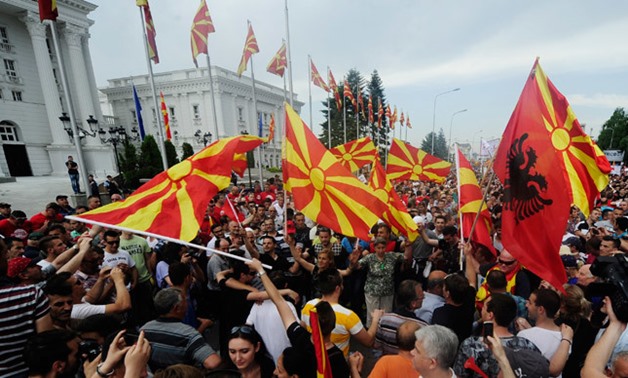
Anti-government demonstration, 17 May 2015. Photo Reuters / Ognen Teofilovski
30 September 2018: Macedonia has struggled for recognition of its name since its birth in 1991 when the landlocked country declared independence from Yugoslavia. Athens protested about the name immediately, accusing Skopje of stealing it from its own northern province also called Macedonia.
The dispute stretches back nearly three decades, with both countries claiming links to Alexander the Great's ancient empire of Macedon, which spanned the territories.
A grandiose "antiquisation" project under Macedonia's former government that plastered Skopje with neo-classical facades and statues of Alexander the Great added fuel to the fire.
But in June Macedonia's new premier Zoran Zaev and his Greek counterpart Alexis Tsipras reached a landmark compromise under which Greece would drop its objections to Macedonia joining the EU and NATO in return for the name change.
"I hope that the result will be positive. This referendum will change something if it opens the door for Europe and NATO," 74-year old retired nurse Olivera Argirovska said after casting her ballot in downtown Skopje.
"It will change things for the youth".
Some feel it is embarrassing to have to change the name at the request of another country. But a desire to anchor their future to the West – and the economic prosperity that it could bring – is a powerful motivation to accept the deal in one of Europe's poorest nations.
"We cannot really say it is fair, but the EU and NATO matter more for all of us, so let's move forward," 28-year-old Abedin Memeti said ahead of the vote.
The referendum is not binding, but a 'yes' majority would give parliament a political mandate to change the constitution.
An unpopular compromise
Georges Prévélakis, a professor in geopolitics at Paris’s Panthéon-Sorbonne University and an expert on the Balkan countries, told FRANCE 24 that the referendum is the result of much more than just a bilateral deal between Macedonia and Greece, and comes after massive diplomatic pressure from the wider international community, including the United States, Germany and France.
“It’s important to understand that both the United States and especially the European Union have high-stakes interests when it comes to this issue and that they’ve managed to move the situation forward. For them, it’s first and foremost about extending their influence in this area in regards to Russia. The counterpart promise is spelled out in the question posed this Sunday: Macedonia’s admission into NATO and the EU.”
Prévélakis said that both Macedonia and Greece had a lot to gain from a potential name-change. “Greece would get a change it’s been calling for for almost 30 years, while Macedonian – by becoming “the Republic of Northern Macedonia” would safeguard its language and recognise the Macedonian national identity. For those who know the history of the region, this is not insignificant. The Bulgarians, for example, have for a long time denied this Macedonian identity, considering the [Macedonian] population to be Bulgarian.”
But, he said, the deal is unpopular among Macedonians and Greeks alike. “It’s a compromise,” he said, but noted that the “yes” side has nevertheless been gaining in the polls. “The campaign in favour of a name change has managed to get its arguments heard. These have mainly been about the country’s economic situation, which is not good: Unemployment is over 20 percent, and the average salary is at €350 a month – the lowest in the Balkans. Proponents of a name change are appealing to the Macedonians by making them look forward to a brighter future on the back of admission into the EU and all the subsidies that go with it.”
He added that an EU admission is especially important for the country’s Albanian minority: “Brussels protects and guarantees the rights of minorities."
If the deal is backed in the referendum and is ratified by two-thirds of MPs, the Greek parliament will be called on to give the final stamp of approval.
While the Macedonian government plans to call any significant majority in favour of the deal a success, the right-wing opposition may question the vote's credibility if turnout is below 50 percent.
Some critics of the name deal have been calling for a boycott, including President Gjorge Ivanov, who is allied with the nationalist opposition.
Massive emigration in recent decades could also affect the numbers, with nearly a quarter of the 2.1 million population estimated to live abroad.
Fewer than 3,000 of those overseas have signed up to vote.

Comments
Leave a Comment